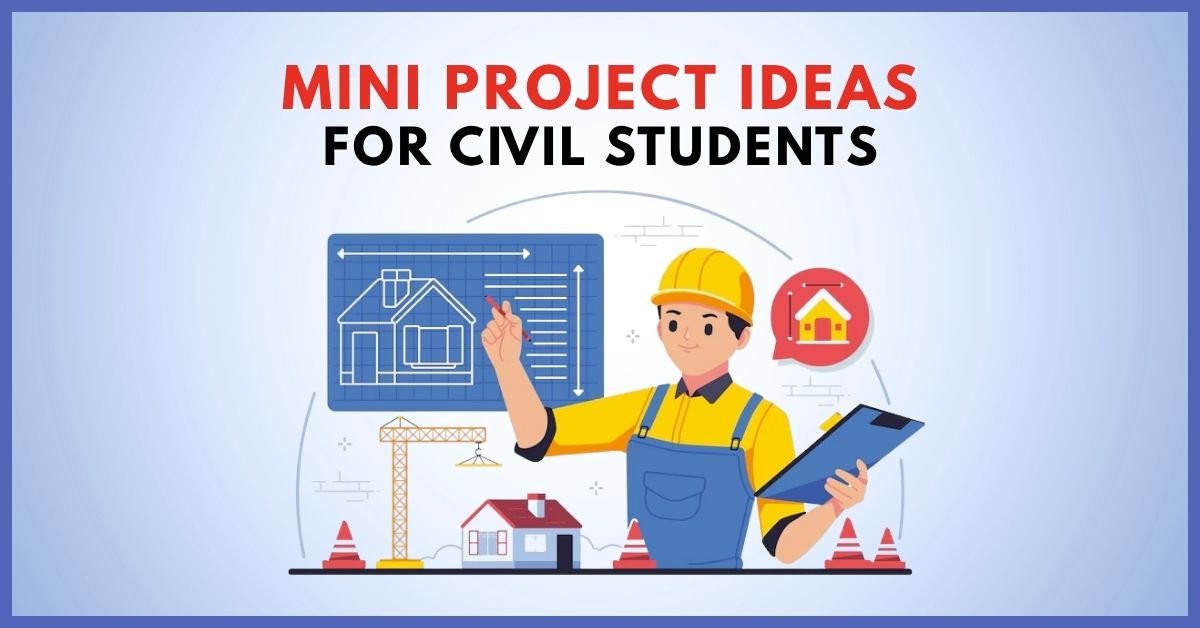Mini Project Ideas for Civil Students

Civil engineering is one of the oldest and most impactful engineering fields. From roads and bridges to dams and smart cities, civil engineers shape the physical world around us. While textbooks and theory are essential, hands-on projects help you truly understand engineering concepts.
If you’re a civil engineering student looking for mini project ideas, you’re in the right place. Whether you’re in your 2nd year, 3rd year, or preparing for your final year, mini projects will not only help you learn but also make your resume stand out during placements.
In this article, we’ll explore 50+ mini project ideas for civil students—ranging from beginner-friendly to advanced concepts.

Why Mini Projects Are Important for Civil Engineering Students
Before jumping into the project list, let’s understand why mini projects matter:
- Practical Learning: You move beyond theory and apply classroom concepts to real problems.
- Skill Development: Projects help you learn surveying, design, material testing, and construction techniques.
- Placement Preparation: Recruiters prefer candidates with hands-on project experience.
- Research & Innovation: Projects often become the foundation for final-year or even professional research.
- Teamwork & Management: Mini projects simulate real-world teamwork and project management scenarios.
How to Choose the Right Civil Mini Project
When selecting a project, consider these factors:
- Interest Area – Structural, environmental, geotechnical, transportation, or construction engineering.
- Resources Available – Materials, lab equipment, and software tools.
- Timeframe – Mini projects should be doable in a short span (2–6 weeks).
- Innovation Level – Aim for projects that solve real-world problems or apply sustainable methods.
- Academic Requirements – Some universities provide a project list; others give flexibility.
List of Mini Project Ideas for Civil Students
Here’s a categorized breakdown of 50+ project topics:
Structural Engineering Projects
These projects focus on design, load analysis, and construction materials.
- Design of earthquake-resistant single-story building
- Study of prefabricated construction techniques
- Load analysis of a simply supported beam using ANSYS/STAAD Pro
- Comparison of strength between conventional concrete and self-compacting concrete
- Analysis of steel vs concrete structures for small residential buildings
- Use of fiber-reinforced concrete in pavement design
Transportation Engineering Projects
Transportation is a crucial branch dealing with roadways, railways, airports, and traffic flow.
- Traffic density survey at a busy urban junction
- Pavement distress survey and rehabilitation techniques
- Comparative study of flexible vs rigid pavement designs
- Analysis of public transport efficiency in your city
- Road safety audit for a selected stretch of highway
- Smart traffic light management system using IoT (interdisciplinary project)
Environmental Engineering Projects
Focus on sustainability, pollution control, and eco-friendly construction.
- Rainwater harvesting system design for a college campus
- Greywater recycling model for residential apartments
- Design of an eco-friendly septic tank system
- Water quality analysis of a local pond/river
- Waste segregation model for urban households
- Study of plastic waste in road construction
Geotechnical Engineering Projects
These involve soil testing, foundation design, and ground improvement techniques.
- Soil stabilization using fly ash or lime
- Bearing capacity test of sandy vs clayey soil
- Study of soil liquefaction under seismic conditions
- Groundwater recharge model in clayey soils
- Comparative study of shallow vs deep foundations
Surveying & Remote Sensing Projects
Surveying is fundamental in civil engineering for mapping and construction layout.
- Contour mapping of a given area using Total Station
- Survey of college campus using AutoCAD Civil 3D
- Comparative study of chain survey vs digital survey methods
- GIS-based land use mapping project
- Drone-based survey of construction sites
Construction Management Projects
These projects focus on project planning, cost management, and efficiency improvement.
- Cost estimation of a small residential building
- Time-cost optimization using project management software (Primavera/MS Project)
- Study on labor productivity in construction projects
- Risk analysis in construction projects
- Comparative study of green buildings vs conventional buildings

Innovative & Sustainable Civil Projects
Civil engineering is rapidly evolving with sustainability and innovation at its core.
- Bamboo as an alternative construction material
- Energy-efficient building design (using passive cooling techniques)
- Recycled aggregates in concrete mix design
- Low-cost housing using locally available materials
- Smart city infrastructure planning at a micro-level
Tips to Execute Your Mini Project Successfully
- Plan Early: Choose your topic in advance and collect resources.
- Form a Team: If group projects are allowed, divide tasks based on skills.
- Use Software Tools: STAAD Pro, AutoCAD, Revit, ANSYS, and Primavera are industry-relevant.
- Document Everything: Maintain a proper project report with objectives, methodology, results, and conclusion.
- Seek Guidance: Take feedback from professors or industry experts.
- Focus on Innovation: Even simple projects can stand out with creative execution.
Frequently Asked Questions (FAQs)
Q1. Which mini project is best for civil students?
A project related to your interest area—like structural design, surveying, or water management—is best. Rainwater harvesting and traffic analysis are among the most popular.
Q2. Can mini projects help in placements?
Yes. Recruiters look for practical knowledge. Mini projects showcase your problem-solving and technical skills.
Q3. What software should I learn for civil mini projects?
AutoCAD, STAAD Pro, Revit, Primavera, and GIS tools are commonly used.
Q4. How long does it take to complete a civil mini project?
Most mini projects take 2–6 weeks, depending on complexity and team size.
Q5. Can mini projects be done individually?
Yes. Many projects like soil testing, water quality analysis, and cost estimation can be done individually with proper planning.
Conclusion
Mini projects are more than just academic requirements—they’re opportunities to apply classroom knowledge to real-world challenges. As a civil engineering student, working on these projects will sharpen your skills, improve your resume, and prepare you for a professional career.
Whether you pick a structural, environmental, or sustainable project, ensure that you document it well and showcase it during internships or interviews.
Author Profile
- At Learners View, we're passionate about helping learners make informed decisions. Our team dives deep into online course platforms and individual courses to bring you honest, detailed reviews. Whether you're a beginner or a lifelong learner, our insights aim to guide you toward the best educational resources available online.
Latest entries
 UncategorizedOctober 3, 2025AKTU BTech Important Questions & Notes
UncategorizedOctober 3, 2025AKTU BTech Important Questions & Notes Exam Revision NotesSeptember 24, 2025C++ Programming Cheatsheet – STL, OOP Concepts, Syntax
Exam Revision NotesSeptember 24, 2025C++ Programming Cheatsheet – STL, OOP Concepts, Syntax Exam Revision NotesSeptember 22, 2025Java Programming Cheatsheet – Collections, OOP, Exceptions
Exam Revision NotesSeptember 22, 2025Java Programming Cheatsheet – Collections, OOP, Exceptions UncategorizedAugust 28, 2025BTech 1st Year Notes & Cheatsheets (Subject-Wise)
UncategorizedAugust 28, 2025BTech 1st Year Notes & Cheatsheets (Subject-Wise)







